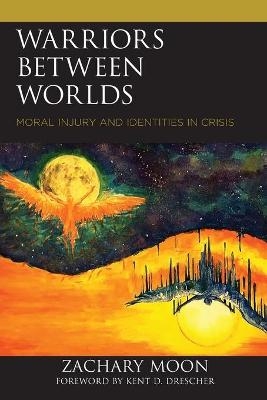
Warriors between Worlds
Moral Injury and Identities in Crisis
Seiten
2021
Lexington Books (Verlag)
978-1-4985-5461-9 (ISBN)
Lexington Books (Verlag)
978-1-4985-5461-9 (ISBN)
This book expands on moral injury discourse and defines a new approach to conceptualizing and addressing moral injuries by articulating a new term—moral orienting systems—that better describes the process of morally significant traumas.
The concept of moral injury emerged in the past decade as a way to understand how traumatic levels of moral emotions generate moral anguish experienced by some military service members. Interdisciplinary research on moral injury has included clinical psychologists (Litz et al., 2009; Drescher et al., 2011), theologians (Brock & Lettini, 2012; Graham, 2017), ethicists (Kinghorn, 2012), and philosophers (Sherman, 2015). This project articulates a new key concept—moral orienting systems— a dynamic matrix of meaningful values, beliefs, behaviors, and relationships learned and changed over time and through formative experiences and relationships such as family of origin, religious and other significant communities, mentors, and teachers. Military recruit training reengineers pre-existing moral orienting systems and indoctrinates a military moral orienting system designed to support functioning within the military context and the demands of the high-stress environment of combat, including immediate responses to perceived threat. This military moral orienting system includes new values and beliefs, new behaviors, and new meaningful relationships. Recognizing the profound impact of military recruit training, this project challenges dominant notions of post-deployment reentry and reintegration, and formulates a new paradigm for first, understanding the generative circumstances of ongoing moral stress that include moral emotions like guilt, shame, disgust, and contempt, and, second, for responding to such human suffering through compassionate care and comprehensive restorative support. This project calls for more effective participation of religious communities in the reentry and reintegration process and for a military-wide post-deployment reentry program comparable to the encompassing physio-psycho-spiritual-social transformative intensity experienced in recruit-training boot camp.
The concept of moral injury emerged in the past decade as a way to understand how traumatic levels of moral emotions generate moral anguish experienced by some military service members. Interdisciplinary research on moral injury has included clinical psychologists (Litz et al., 2009; Drescher et al., 2011), theologians (Brock & Lettini, 2012; Graham, 2017), ethicists (Kinghorn, 2012), and philosophers (Sherman, 2015). This project articulates a new key concept—moral orienting systems— a dynamic matrix of meaningful values, beliefs, behaviors, and relationships learned and changed over time and through formative experiences and relationships such as family of origin, religious and other significant communities, mentors, and teachers. Military recruit training reengineers pre-existing moral orienting systems and indoctrinates a military moral orienting system designed to support functioning within the military context and the demands of the high-stress environment of combat, including immediate responses to perceived threat. This military moral orienting system includes new values and beliefs, new behaviors, and new meaningful relationships. Recognizing the profound impact of military recruit training, this project challenges dominant notions of post-deployment reentry and reintegration, and formulates a new paradigm for first, understanding the generative circumstances of ongoing moral stress that include moral emotions like guilt, shame, disgust, and contempt, and, second, for responding to such human suffering through compassionate care and comprehensive restorative support. This project calls for more effective participation of religious communities in the reentry and reintegration process and for a military-wide post-deployment reentry program comparable to the encompassing physio-psycho-spiritual-social transformative intensity experienced in recruit-training boot camp.
Zachary Moon is assistant professor of practical theology at Chicago Theological Seminary and author of Coming Home: Ministry That Matters with Veterans and Military Families.
Acknowledgments
Foreword
1. Introduction
2. Diagnosing Moral Injury
3. Moral Orienting Systems
4. Moral Mutations
5. First Life
6. In The Military Now
7. (Re)Turning Warriors
8. Conclusion
References
About the Author
| Erscheinungsdatum | 17.05.2021 |
|---|---|
| Reihe/Serie | Emerging Perspectives in Pastoral Theology and Care |
| Vorwort | Kent D. Drescher |
| Verlagsort | Lanham, MD |
| Sprache | englisch |
| Maße | 154 x 219 mm |
| Gewicht | 204 g |
| Themenwelt | Geisteswissenschaften ► Psychologie ► Persönlichkeitsstörungen |
| Geisteswissenschaften ► Religion / Theologie | |
| Medizin / Pharmazie ► Medizinische Fachgebiete ► Notfallmedizin | |
| Sozialwissenschaften ► Soziologie | |
| ISBN-10 | 1-4985-5461-X / 149855461X |
| ISBN-13 | 978-1-4985-5461-9 / 9781498554619 |
| Zustand | Neuware |
| Haben Sie eine Frage zum Produkt? |
Mehr entdecken
aus dem Bereich
aus dem Bereich
Buch | Softcover (2023)
Urban & Fischer in Elsevier (Verlag)
CHF 76,95
Buch | Softcover (2022)
Klett-Cotta (Verlag)
CHF 37,80


